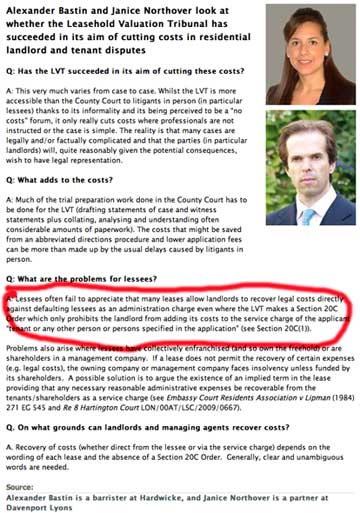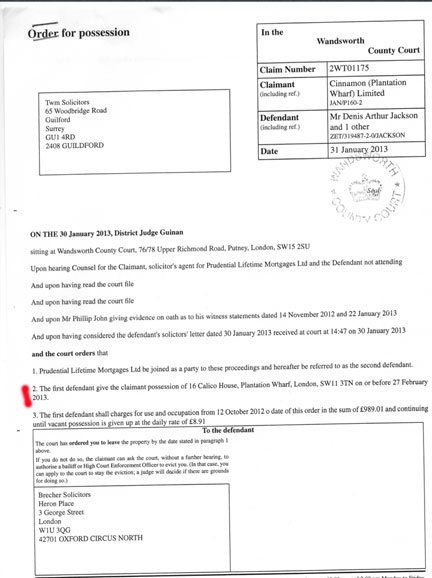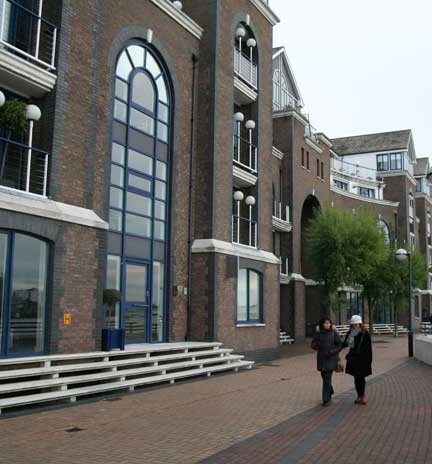
COMMENT by Sebastian O’Kelly
 Two days ago when the barrister Alexander Bastin successfully asked the judge at Wandsworth County Court to throw me out of his court – citing the Human Rights Act – the whole sorry saga of Dennis Jackson and Plantation Wharf reached a new low-point … although not one without an element of dark humour.
Two days ago when the barrister Alexander Bastin successfully asked the judge at Wandsworth County Court to throw me out of his court – citing the Human Rights Act – the whole sorry saga of Dennis Jackson and Plantation Wharf reached a new low-point … although not one without an element of dark humour.
Bastin, representing the freeholder of Plantation Wharf, Cube Real Estate, has defeated Jackson at every turn to the point where the latter was facing homelessness and destitution. The hearing – with only two days to go before Jackson’s £800,000 flat could have been lost forever – was to request the lifting of the forfeit order granted on January 30.
So when Bastin suggested that the Human Rights Act was grounds for ejecting the “press”, to use his term, one can only assume he was cracking some sort of lawyerly joke. The only human rights at issue were those of Jackson himself, by whose invitation I, and Martin Boyd, my colleague at the Leasehold Knowledge Partnership, had come to the court.
Jackson, 73, who was not legally represented, and a barrister for the Prudential, his mortgage lender, told the judge that they had no objection to our attending. But Bastin insisted and the judge – apologetically – ordered us out.
As a result, a closed court was convened to decide whether to take from Jackson every significant asset that he has, without the public having any right to be present.
Only in leasehold would such a thing be possible, one is tempted to conclude.
Having taken one bad decision – it should never be a minor matter to throw the public out of a court – Deputy District Judge Colquohoun sensibly lifted the forfeiture order returning the lease to Jackson as the Prudential agreed to pay off his outstanding debts.
These are £76,086.20, and are wholly accounted for in legal costs. Jackson paid off the original disputed £7,548 service charges years ago.
Enormous though the legal costs are, the lawyers have appealed to the Upper Tribunal (Land Chamber) for more.
Jackson is desperately trying to sell his flat, where he has lived for 16 years, and what he walks away with is the open question.
At this point, it is worth re-capping on what has been going on at Plantation Wharf, a complex on the river at Battersea of 160 flats and 94 commercial premises that was built 18 years ago.
The neighbours include John Bercow, the Speaker of the House of Commons, who bought a £935,000 leasehold house in January, and Nigella Lawson, who has her TV studio kitchen there.

That Jackson – the third resident to face forfeiture at the site in two years – has been naïve, he would not deny. He has also been overwhelmed by the case, and has not understood the intricacies of leasehold law, while facing opponents who are professional experts.
He did himself much harm by not attending an appeal to the Land Tribunal.
It is argued that he is the author of his own folly. But he has also been let down by the protections of leasehold law and been assailed by absurdly expensive lawyers who know this system backwards. Their “colossal” costs have been criticised by tribunals involved in this case.
This saga began in May 2009 when Jackson and his neighbour Rosemary Irving, the then chairman of the Plantation Wharf residents’ association, refused to pay service charges for items for which the residents were repeatedly charged but did not receive. These included hall carpets and contributions to electronic gates for the Thames riverside complex.
The two were taken to county court and the case was referred, as expected, to the LVT for a three-day hearing in February 2010, with a fourth in October. It made a ruling in January 2011.
The two were not apprehensive. The Ministry of Justice and the Leasehold Advisory Service both repeat the highly misleading information that legal costs at LVT are capped at £500. Two millionaire leaseholders defying service charges in prime London sites have made the same mistake and have contacted LKP, after reading with alarm the reports on the Jackson case.
At LVT, the inexpert leaseholders faced an onslaught from the freeholder’s team: barrister Alexander Bastin, solicitor Janice Northover, who began the case at Davenport Lyons and later moved to Brecher, and Phillip John, managing director of Mayfair-based property managing agent Tideway.
In Jackson’s admission, he and Irving were “utterly overwhelmed”.
Nonetheless, they did not do that badly: Jackson’s outstanding service charges were re-estimated from £9,164 to £7,548, and Irving’s from £6,651 to £3,952.
After these reductions, another £200 was knocked off by the tribunal.
The LVT considered the legal fees, which were £100,000 at this point, and issued a section 20c order that they could not be recouped through the service charge. It also reduced them by a third, which was relevant in subsequent litigation.
It made stinging criticism of Tideway’s accounts:
“The repeated over-budgeting, sometimes by very substantial sums, the failure properly to communicate with leaseholders, and the failure in some cases properly to demonstrate precisely how excess monies have been allocated to other works, all support the contention that there should be some limitation on the legal costs recoverable by the applicant as service charge.”
However, the freeholder’s legal team successfully appealed against this ruling on legal costs to the Upper Tribunal (Lands Chamber) in December 2011. Fatally, neither Jackson nor Irving were present.
They did not have the money, Jackson says, and besides they still thought the costs awarded against them would be limited to £500.
Interestingly, the Upper Tribunal made the following observation:
“The tribunal has been informed that large costs approaching £100,000 have been incurred in pursuit of these proceedings, which in any view is a colossal sum.”
The freeholder’s lawyers also launched another LVT action to recover the costs through an administration charge, meaning that Jackson and Irving would have to pay the costs themselves.

Bastin and Northover appear to be rather pleased with their cleverness on this, and have written articles for both Property Week and Estates Gazette telling readers – presumably their putative clients – how they did it.
It can be agreed that it is right that a tiresome litigant leaseholder pays legal costs rather than dumping them on this neighbours, who may not agree with the dispute. This has been the subject of an Upper Tribunal ruling.
In this case, Rosemary Irving was chairman of the Plantation Wharf residents’ association, and Jackson insists that the action was supported informally by a number of residents. This was the act of two frustrated residents, not that of isolated habitual litigants.
It is also worth noting that the service charges from Tideway have come down since the two made a stand. LKP would be happy to publish an explanation why.
In July 2012, a new LVT was called to settle the issue of the costs and, at last, Irving had grasped the seriousness of the situation. She appointed a solicitor and barrister, with Jackson informally agreeing to reimburse half the costs.
But immediately before the hearing, Irving died. Jackson believes the strain of the litigation was a contributing cause of her death. Jackson asked for an adjournment to LVT so that he could mourn his friend, attend her funeral and employ a lawyer, as he had no legal representation.
This was refused, meaning that Jackson – again – attended a crucial two-day hearing without legal representation. The LVT allowed him the afternoon off to attend Irving’s funeral.
The tribunal ruled that the legal costs could be charged as either an administration charge or a service charge, as the freeholder wished. In Jackson’s case, these amounted to £39,951.

Throughout this litigation, Jackson and Irving had been opposed by Plantation Wharf Management Limited, a company set up to manage the site but controlled by Cube Real Estate.
But in October 2011, Cube handed over control of Plantation Wharf Management Limited to the residents, something to which they were always entitled but had failed to exercise in the 18 years since the site was built.
The new chairman of PWML was resident Bryan [Howard] Lewis, 64, a disgraced former property solicitor with a conviction in the 1990s for a criminal offence involving dishonesty and “an appalling disciplinary history”, according to the Solicitors’ Disciplinary Tribunal. Separately, in 2008 three London solicitors were suspended for three to six months each, and fined £14,000 each, for his actions while he was employed as a clerk in conveyancing work.
Lewis claims that he “offered to negotiate a peace settlement between the management company and the freeholder”. Jackson strongly denies that this offer was ever made.
“Dennis and Rosemary were urged by me and others not to continue with this action. They were told this many times,” Lewis told LKP last November.
Whatever the truth of this, Lewis and the board of his fellow resident-directors decided to continue the legal action against Jackson and Irving. Had they not done so, they believed, then all the residents faced having to pay the outstanding legal costs themselves. This was unfair, they felt.
Lewis portrays Jackson as an obdurate and foolish litigant. As he puts it: “He has been the author of his own ruin, just as I was of mine. Thanks to family and friends I managed to put my life back in order, and so must he.”
There is, of course, no equivalence between Lewis’s criminality and becoming caught up in extremely complex and expensive leasehold litigation.

The residents’ controlled PWML continued the action in July 2012 and approved – perhaps even insisted on – the forfeiture proceedings against Jackson, which would have cleared the legal costs that they were so concerned about. (Forfeiture is undertaken by the freehold owner, in this case Cinnamon (Plantation Wharf) Limited, which is owned by Cube Real Estate. Cube stood to gain the windfall of an £800,000 property had the forfeiture not been waived.)
Jackson avoided forfeiture in November 2012 after LKP found him an open access barrister, who successfully asked for a 28-day delay.
Jackson had no money, and the only means of saving his home, and his life savings were to involve the Prudential, with whom he has a £175,000 equity release mortgage.
Owing to unaccountable bungling between his solicitors, TWM of Guildford, and Eversheds, for the Prudential, no clear agreement had been made to avoid the forfeiture at Wandsworth County Court when the deadline expired on January 30.
Janice Northover, of Brecher, representing the freeholder, demanded and obtained forfeiture of Jackson’s property.
Since that date, LKP together with MPs Sir Peter Bottomley and Jane Ellison, and executives at the highest level of the Prudential, have made repeated efforts to get the lawyers to act.
Reluctantly, one has to sympathise with Janice Northover’s exasperated observation in her witness statement before the application to lift the forfeiture last Monday:
“I am surprised that the Intervenor [the Prudential] has made this application so late in the day. The Intervenor instructed solicitors as far back as 27 November 2012 and attended the hearing before District Judge Guinan on 30 January 2013. The Intervenor was therefore fully aware of the deadline of 27 February, but there is no explanation in Ms Moore’s [Evershed solicitor] as to why it has chosen to make its application only two working days before the date of possession.”
Forfeiture is a feudal relic of leasehold law and must not be confused with a re-possession order: it means the lease is handed back to the freeholder. Jackson and the Prudential would have lost their entire interests in the property.
It is quite clear that Jackson only avoided losing everything he has by a hair’s breadth.
The forfeiture has been lifted and the Prudential has paid off Jackson’s debts of £76,086.66.
Litigation, however, continues as Baston and Northover are appealing to the Upper Tribunal, on behalf of PWML, against the July 2012 LVT ruling of £39,951 of costs. They want more, and so it continues.
There are practical lessons for leaseholders to be drawn from the Jackson case:
- That legal costs are NOT capped at £500 at LVT. The Ministry of Justice and LEASE, the Leasehold Advisory Service, must stop repeating this misleading information. Leasehold Knowledge Partnership urges leaseholders disputing service charges to pay them while reserving their rights, and then claim the money back. It is difficult under these circumstances for freeholders to claim legal costs as an “administration charge”.
- That while forfeiture is a rare event it can very easily come about owing to blunders that are not exclusively those of the layman.
One also has to address the neighbours of Jackson at Plantation Wharf, and particularly the directors of the PWML, who have been driving this litigation since October 2011. They need to ask themselves whether it was really necessary to subject a 73-year-old man to this kind of misery.

Lewis has made it clear that, since October 2011, he and the other directors could have ended litigation at any point.
Was spending £76,000 for a £7,500 service charge worth it, and who has gained?
Discussing this case with other freeholders and managing agents, executives at LEASE, leasehold lawyers and civil servants, it is clear that they are astonished by the events at Plantation Wharf.
For most professionals in property management, forfeiture is only the very last resort in the most extreme circumstances.
Was that the case with Jackson?
Were Rosemary Irving and Dennis Jackson really so isolated and alone when they made this stand against service charges, which have since been reduced so markedly? Or were they initially supported and encouraged, and then dumped when things went wrong?
Lewis is contemptuous of their LVT action, saying they were only awarded £200.
In spite of the legal barrage, the original LVT made stinging criticism of Tideways complex and late accounts, issued a 20c order stopping lawyers landing the legal costs on the leaseholders as a service charge and went out of its way to reduce these costs – which weren’t permitted – by a third.
Irving’s service charges were reduced by more than a third and Jackson’s by a quarter, after Tideway had to re-do its sums. The £200 was awarded after these reductions. If they had had a team to match Northover and Bastin where might this have led?
The residents did the right thing to gain control of PWML in October 2011, but why did they remain the poodle of the freeholder and the lawyers?
Had no one noticed, or considered, the strain of this ordeal on Jackson? And what about Rosemary Irving, once a prominent figure in that community, dying a week before the final LVT hearing?
Too many residents appear to have been happy to remain ignorant of the case, turn the other way or pretend that there was no alternative to … taking every possession that Dennis Jackson has off him because he disputed a £7,500 service charge?
Jackson cannot afford to live at Plantation Wharf and should have sold up years ago. That is clear.
Over the past few months, a handful of his neighbours have inquired about his welfare and expressed sympathy, speaking to him or sending emails. I believe that he has been very gratified and moved by their interest.
But, on the whole, he has little cause to leave Plantation Wharf with much regret.
LKP will publish any statement from individuals or companies named in this article. Readers are, of course, welcome to comment























I am so glad that Dennis has not lost his home, well done LKP and everyone involved in helping him. Who would believe that in 2013 that this sort of thing could happen! Unbelievable…
Who was it that said it was only the bankers that were wearing masks!…………..
Sounds like barrister Alexander Bastin – described in the Legal 500 2012 edition as ‘”a solicitor’s dream” – knows his stuff. Up against such a dream (Bastin, we read, is also a competitive cyclist), the hapless Dennis Jackson (73) was not just naive but ostrich-like; apparently not even bothering to turn up for an earlier land tribunal hearing. In the middle, we have an apologetic judge who was perhaps just a little out of his depth?
So, commenting as an aggrieved leaseholder with no legal training whatsoever, I’d say Jackson brought entirely the wrong case. He is fortunate to have had LKP fighting his corner with more recent support from the Pru – or he’d be homeless by now.
I’d put money on the possibility of arguing that the freeholder and/or managing agent and/or directors of the management company at Plantation Wharf are in breach of the ‘mechanism’ of the lease (LTA 1985 s19) relating to the collection of service charge. If so, then Jackson would be entitled to a significant refund of service charge and in a strong position to counterclaim for cost by way of damages. Ralph Bankes at Iliffe’s Booth Bennett (“a gem of a Firm”, Chambers 2013) has a keen eye and I’ve found him a pleasure to work with in the past. A tonic, in fact.
Sebastian, your reporting is exemplary. Bravo!
ps should Nigella be ‘working from home’? What does it say in her lease about using her flat for commercial purposes?
It is a live/work unit. She lives in Belgravia, it is reported.
Just want to support the spirit of previous posts. The world of leasehold law is indeed challenging to survive when there are problems. Collective action is necessary. Thanks to all at LKP for their commitment.
This case is just extraordinary and should be a major news item.
Meanwhile…just up the road, it is reported (Daily Telegraph March 2, 2013) :
A senior judge has made an important ruling in favour of transparency in the family courts.
Mr Justice Mostyn lifted a ban on a Sunday Telegraph columnist, reporting on a case involving the future of children who are living with their mother.
The injunction barred the columnist from making any mention of the dispute, known as MvM and the London Borough of Sutton.
However, last week the High Court heard how the order prevented the reporting of proceedings that were “clearly in the public interest”.
In his ruling, Mr Justice Mostyn said he was lifting the injunction “because the emphasis should be on transparency” in the courts.
He added: “ [the columnist] is perfectly entitled to be as rude as he wants about anybody he wants. That is what freedom of speech is about.”
I do not suggest that the admirable Sebastian O’Kelly would be other than courteous in the extreme in his reporting and it seems very unfortunate that he was denied access against the express wishes of Jackson and counsel for the Pru, but the County Court might usefully be guided by its superior when the public interest in the oppressive use of forfeiture proceedings is as clear as that in family court proceedings.
All my support and good wishes
John
From ‘Raymondo’
This is an appalling situation but nothing is surprising any more in leasehold land.
Denis Jackson and Rosemary Irving may well have been naive but perhaps their biggest mistake was to trust a system SUPPOSED to help leaseholders. How sad that Rosemary died and how disgusting that Denis was not given time by way of an adjournmment to even mourn his friend. I hope Denis will soon be able to sell his flat, maybe buy a nice little FREEHOLD property somewhere and have the ‘quiet enjoyment’ he deserves!
I would also say to those ‘neighbours’ of his: Watch your backs you could be next as it appears to be very easy to face forfeiture in this block!
I would also like to know how Mr Lewis can act as a director with a criminal record?
As for the closed court scenario how can justice be seen to be done? It is wrong in the family court (having experienced this) and it was definitely wrong here.